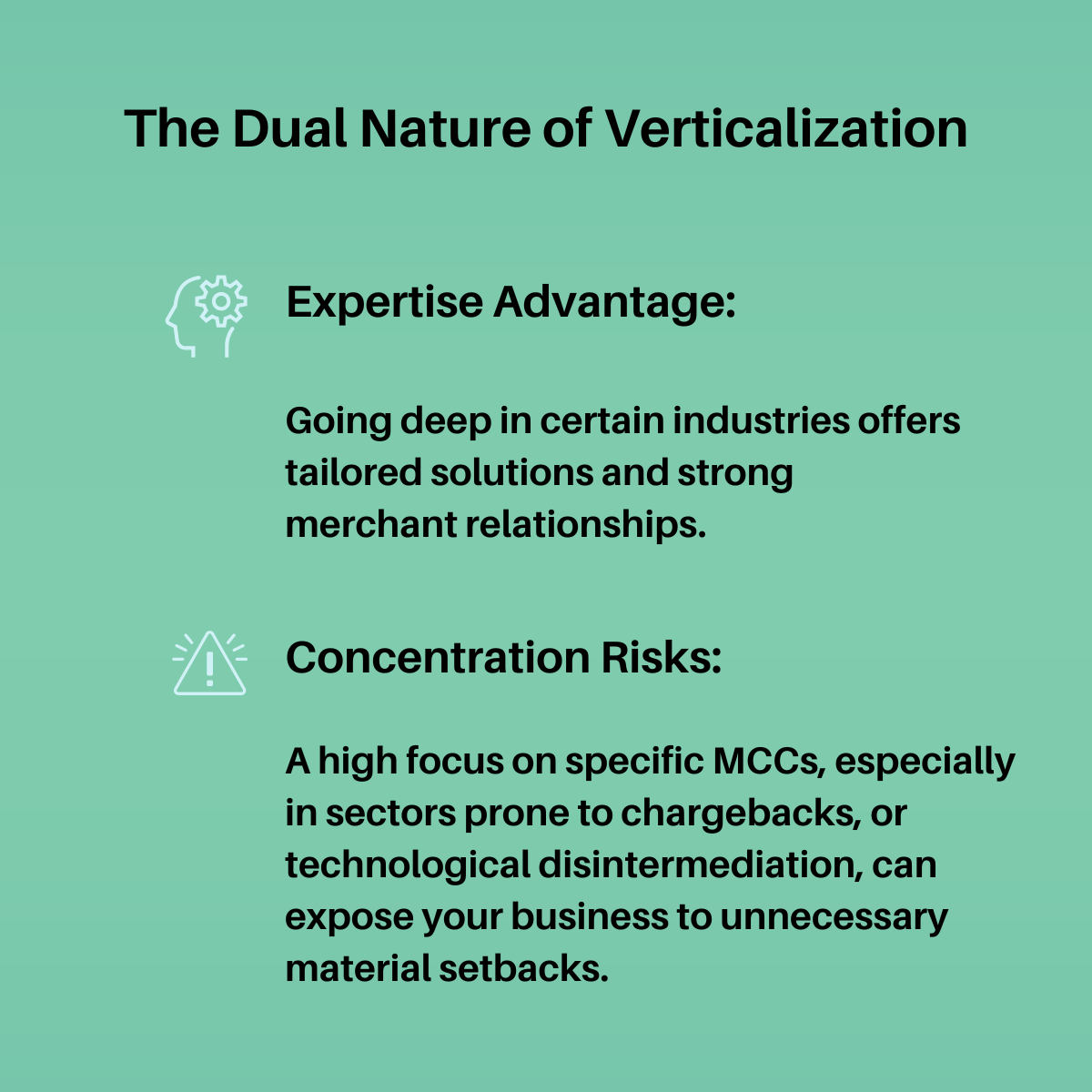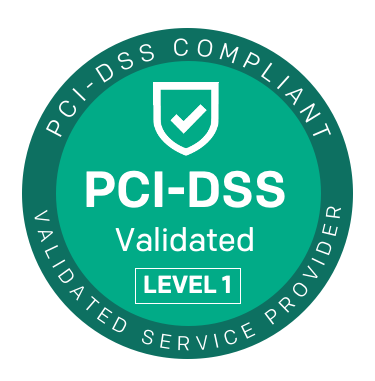The Duality of Verticalization in Merchant Portfolio Management
Introduction
As someone managing a portfolio of assets, you're likely well aware of how crucial verticalization is in shaping your merchant portfolio management strategy. Implementing such a strategy effectively, however, hinges on leveraging advanced tools like Rezidual A.I. to gain deeper insights into industry-specific trends.
Verticalization, a strategy distinctive for its “inch wide, mile deep” philosophy, focuses on consolidating the bulk of your merchant portfolio into specific industry verticals or merchant categories. Specifically, you are deep diving into the unique demands, behaviors, and transactional patterns of a specific sector, such as educational institutions, B2B enterprises, and healthcare services.
This strategy is more than a structural shift; it's a pivot toward specialized approaches. In today's market, where generic solutions fall short, verticalization empowered by Rezidual A.I.'s insights allows you as a payment processor or merchant acquirer to tailor your services precisely, enhancing quality, satisfaction, and growth. It positions you as an “expert” in your focus sectors, providing a competitive edge through depth of knowledge and expertise.
In exploring verticalization in merchant portfolio management, remember it's a strategic evolution. You're not just adapting; you're leading, transforming complex data into actionable insights and decisions. Let's delve into how verticalization, driven by analytics, is reshaping merchant portfolio management.
Why Opt for a Vertical Strategy
When you adopt a vertical strategy, you focus on developing specialized competence, crafting tailored solutions, and achieving deep market penetration.
Specialized Expertise
By zeroing in on specific sectors, you gain a deep understanding of the unique requirements of merchants and their customers in that space, establishing yourself as a knowledgeable partner. You gain a profound understanding of the transactional experience as well as the specific pain points and challenges that must be solved. This expertise is crucial for providing industry-leading solutions and client satisfaction. For instance, in the healthcare sector, your in-depth knowledge about HIPAA compliance and practice management solutions directly leads to a more secure, compliant, and integrated payment experience. In the education vertical, you must understand how institutions of learning rely on the ability to collect tuition separately from cafeteria or extracurricular transactions such as applying funds to student accounts. This nuanced specialization requires unique product offerings that must work in concert with the institution's back-office systems.
Tailored Solutions
With verticalization, you create solutions that precisely meet each industry's particular needs. This strategy extends beyond mere product customization; it aligns your service delivery, customer support, and marketing strategies with the specific characteristics of each industry. For example, in ecommerce, leading providers now offer an “omnicommerce” experience with seamless integration with online shopping platforms (e.g., Shopify, WooCommerce, BigCommerce, etc.), advanced fraud protection, and support for a variety of payment methods (e.g., text, email, etc.). This greatly improves the online retailers' customer experience and overall conversion rates.
Deep Market Penetration
Implementing a vertical strategy leads to focused market penetration. By understanding the nuances of each sector, you can develop targeted marketing strategies, forge strong industry relationships, and uncover niche opportunities. As a result, you will increase sales, improve customer retention and conversion, and ultimately, materially increase enterprise value in the process. For example, in the retail sector, leveraging your knowledge about seasonal shopping trends and consumer behaviors can lead to the development of marketing strategies that are highly effective and resonate with customers.
Partner Integrations
As your visibility in the sector(s) of focus increases, you establish relationships with other vendors serving that same industry. Discovery of value-enhancing integration, both on the product side as well as in the sales and marketing focus, can lead to several benefits. First, the alignment with established entities allows you to leverage their sales process, driving more inbound prospects and lowers your cost of customer acquisition. Additionally, becoming entrenched with a number of critical solution providers will dramatically improve your sales distribution strategy (i.e., “one to many”) as well as lower your customer churn.
To sum up, effectively understanding and catering to the distinct needs of each industry has a significant impact on the success of your business. Analytical platforms with robust capabilities are crucial in helping you quantify and maximize your capital allocation decisions.

The Risks of Verticalization Merchant Portfolio Management
As you pursue a verticalized sales distribution strategy, merchant portfolio management becomes essential as you need to be able to monitor and quantify the capital expenditures made in the evolution of your enterprise. Further, a verticalized approach comes with its own set of challenges to navigate. Apart from the benefits of tailored solutions and deep industry know-how, you should be vigilant about potential hazards such as increased exposure to sector-specific risks (e.g., increased fraud/chargeback challenges), and the idiosyncratic regulatory considerations some industry verticals present.
Exposure to Industry Fluctuations
In your vertical strategy, you must be mindful of the risks tied to over-reliance on a single industry. A heavy focus on one sector can expose your portfolio to significant market volatility (referred to in finance as a portfolio’s “Sigma”). For example, industries like travel and hospitality are highly sensitive to macroeconomic shifts and global events. Concentrating too much in such a sector could lead to substantial revenue losses. To mitigate these risks, diversifying your portfolio across various industries, or sub-industries is a crucial consideration. The most optimal situation is to have exposure to industries that experience opposing reactions to economic cycles; having depth in one sector that thrives in a bear market and in another sector that performs well in a bull market, for example, will ensure that you maintain growth through the peaks and troughs of a recession or temporary economic downturn.
Chargebacks and Fraud Risks
Each industry carries distinctive chargeback and fraud risks. Ordinarily, ecommerce, presents a higher level of chargeback risk due to the non-physical nature of the transaction. Accordingly, this dynamic has important portfolio management implications. When a merchant is terminated it not only represents lost revenue today, but also potentially a degradation in your portfolio’s metrics, such as a material increase in attrition. All of which further undermine your enterprise value. Thus, try to avoid specializing in multiple industries that all share a trademark characteristic of elevated chargeback risk.
Rezidual A.I.'s Role in Merchant Portfolio Management
To successfully implement a verticalization strategy, you must leverage the right tools and insights. Rezidual A.I. leads the way with a first-of-its-kind platform, equipping you with an unparalleled ability to not only comprehend, but also effectively navigate and optimize your portfolio. This platform's diverse features cater to the critical aspects of portfolio management, such as analyzing concentration risks, guiding strategic diversification, and identifying growth opportunities in key sectors. You can also see how these metrics correlate to each other in an enlightening and informative way.
Concentration Analysis Report
It's vital to understand and manage the concentration within your portfolio. Rezidual A.I. addresses this need with its Concentration Analysis Report, a tool that analyzes portfolio revenue and volume by Merchant Identification Number (MID) and Merchant Category Code (MCC). This feature helps you see where your revenue is focused, pinpointing potential vulnerabilities and exposure levels. Armed with this information, you can assess risk levels more strategically and make data-informed decisions.
Strategic Diversification
Despite the benefits of verticalization, it can expose you to sector-specific risks. This is where Rezidual A.I. removes the opacity and provides visibility and guidance for diversifying your portfolio into complementary merchant segments. By using the platform's advanced analytics, you can quickly identify areas for diversification, thereby reducing reliance on a single industry, or major clients. Accordingly, the insights provided help you balance your portfolio across various sectors, reducing the risks associated with market volatility.
Optimizing Growth in Concentrated Sectors
Besides diversification, focusing on market segments with high growth potential is also vital. Rezidual A.I. supports you in identifying these opportunities, offering insights on how to grow within each sector while managing the associated risks. The analytics highlight trends, opportunities, and risks, enabling strategic planning and accurate financial forecasting.

Finding the Sweet Spot
Effective merchant portfolio management of verticalized portfolios requires not only the right data, tools, and insights, but a discerning capital allocation strategy. Finding a balance between focusing in certain vertical markets and diversifying your portfolio is the “home run” every payments entrepreneur hopes to hit. As previously discussed, while specialization offers in-depth insight and tailored solutions, it potentially introduces incremental Sigma (i.e., volatility) into a portfolio asset. Accordingly, astute business leaders who recognize this reality quickly can properly diversify into complimentary verticals, thereby smoothing-out business cycles and substantively increasing their enterprise value.
You need to manage Merchant Category Code (MCC) concentration vigilantly. A high concentration in a few MCCs can expose your portfolio to significant sector-specific risks. Utilizing Rezidual A.I.’s analytics and reporting capabilities, you can effectively monitor your MCC concentration and trends over time.
The platform provides comprehensive portfolio metrics and insights into your revenue streams, and net margins, helping you pinpoint any areas of over-concentration and adjust your strategies accordingly. True portfolio diversification is critical in protecting against market fluctuations in any single sector, ensuring a more stable and resilient revenue stream.
Conclusion
It is imperative to embrace both the challenges and opportunities that come with verticalization. With Rezidual A.I. as your strategic partner, you can turn the intricacies of nuanced portfolio management into a path of nimble discovery and explosive revenue growth.
To better understand how
Rezidual A.I. can help you manage the dual nature of verticalization effectively, delve deeper into our merchant portfolio management solutions. Consider
scheduling a demo or consultation to experience how our platform can assist you in balancing risk and opportunity in your merchant portfolio.




